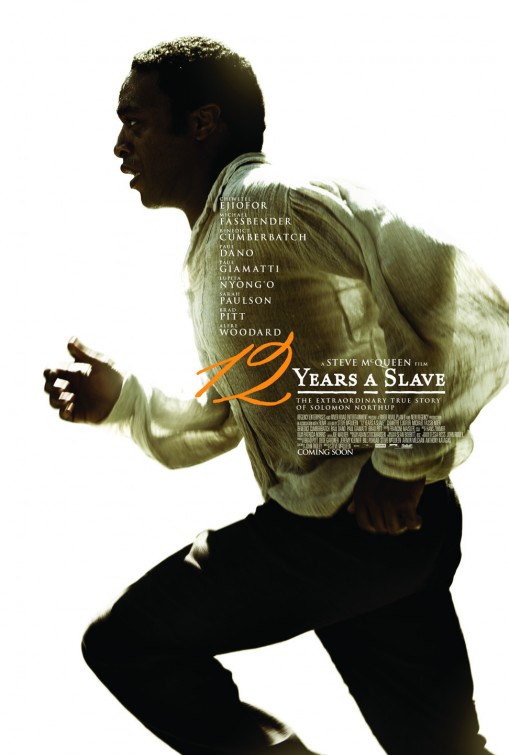The Extraordinary True Story Of Solomon Northup
Director
Steve McQueen
Starring
Chiwetel Ejiofor
Lupita Nyong’o
Michael Fassbender
12 Years A Slave is the story of a free black musician living and working in New York in the early 1840’s, when he is tricked and sold into slavery by two duplicitous white men. So begins Solomon’s [Ejiofor] descent into the southern states of America and his mistreatment at the hands of his newly appointed masters. Witnessing the ease at which black men and women are tortured and killed for speaking out of turn, Solomon does what he must to survive, whilst barely clinging to hope of one day re-establishing his status as a free citizen.
A great deal will be discussed in the media as to the legitimacy and accuracy of this film’s narrative. A moot point if you ask me. Whether every detail of this story is historically correct or whether it was abolitionist propaganda is irrelevant. What is depicted in this film happens to thousands of enslaved peoples and has happened for thousands of years all over the globe. By comparison to things like Django Unchained (admittedly a very lavish revenge fantasy piece) the depictions of slavery in this film are actually quite tame. Sure, we have the occasional horrific whipping visuals, the commonplace lynchings or the surprising use of close-ups rather than portrayed eroticism during the rape scenes but it’s all presented as a matter-of-fact daily occurrence for these captive individuals, rather than a sporadic shock flare.
There aren’t a great many negative points to critique but they affect the final output so heavily that they should be addressed first. McQueen has only been in the public eye for the last few years and even then, only to those who have really been looking. Both Hunger and Shame are exceptional examples of masterful filmmaking from a director with a very keen eye and patient temperament. It is evident, however, that a lot of McQueen’s characteristic traits are absent or thoroughly subdued in this release, giving us Mainstream McQueen. Nowhere is this more prevalent than in the film’s opening which combines long, uncut takes and sporadic chronological jumps with interesting camera angles, subtle motion and absent dialogue – all of which leaves the first five minutes feeling rather disjointed. Personally, I believe audiences should be subjected to different types of filmmaking styles, rather than the simple paint-by-numbers execution they’re familiar and comfortable with but by meeting the studios/investors/potential audiences half way, it isolates the mainstream and frustrates the fringe. There’s also an underlying sense of self-righteousness and disregard that made the lead just a tad dislikeable at times. I know, an appalling comment to make, how dare I? But I’m simply highlighting that the story is so very much about Solomon’s plight, about his injustice as a free man. This is true, of course but it’s presented as if Solomon doesn’t believe himself to be the same as the slaves he is retained with (that’s a statement about equality as a species, I’m not saying he deserves to be enslaved). He fluctuates between swellings of superiority and pity to despair and wallowing. Not the most popular observation, I appreciate that but there is a certain callousness that is never addressed in Solomon, who is always trying to free himself, rather than his people. Sure, the end title cards talk about his work after his release (which is all good). I don’t know, maybe it makes him more human in that regard but the film doesn’t allow the audience the closure to see him helping his fellow man; which is a pity.
At first I believed the score to be both exquisitely terrifying and primal but during the softer moments of reflection, I furrowed my brow and was annoyed that the melodic tones were reminiscent of one of the themes from Inception; believing that this up-and-coming young musician had simply drawn on something familiar and was providing a sound that would sell well. Who was this defamer who could produce such powerful harmonies yet resorted to recycling chunks of orchestral lilts that we, as audience members, had already experienced in a different form? Hans bloody Zimmer? Well this changes the matter entirely. I still believe the roaring sections do exactly as intended but knowing the composer was Hans Zimmer leaves the entire effort feeling a little phoned in. Last year, Zimmer produced the best musical accompaniment of 2013 for Man Of Steel and this is the best he has to offer? Sure, it’s brilliant but I know he’s capable of better. Especially when he’s meant to be complimenting some of the finest performances of the year.
With films of this nature, we tend to focus on the wrong individual. So perfect and plausible is the central character’s suffering that sometimes we turn to the instigators of their affliction and commend them for delving to such a harrowing and horrid place, for reproducing such a lurid example of humanity’s disdain for itself. Which leads me to two specific points regarding the film’s performances. Firstly, we have to address the roles of Solomon [Ejiofor], the hardworking but brutally treated slave Patsey [Nyong’o] and the twisted malicious slave-owner Edwin Epps [Fassbender]. All three live and breathe their respective portrayed existences to the degree that you easily believe that there is no end to the film, no conclusion to the suffering, as movies bound by running time so often rush us to. Ejiofor’s inability to trust anyone or reach out to his fellow man for compassion is heart-wrenching and immediately rings out to audiences as one of the worst imaginable scenarios to be subjected to. Nyong’o working herself ragged day-in, day-out, only to be victimised by the lady of the house out of jealousy and spite is crippling to watch. And finally Fassbender’s vile, maniacal drunken antics are so loathsome but at the same time, so horribly real that we can’t help but despair for everyone around him. And that’s pretty much where my praise for the cast ends I’m afraid; after that we get into a very difficult type-casting area. Now, don’t get me wrong, the performances are brutal and without exception but that doesn’t mean they’re not obvious. Racist, bigoted southerners needed? Let’s get Paul Dano, Garret Dillahunt, Sarah Paulson and Paul Giamatti can be scary, let’s get him too. Oh and we’re legally obliged to include Alfre Woodard so let’s give her a really interesting character and not explore it. What about sympathetic southerners? Not all the white guys are evil. Hmm.. ok, fling in Benedict Cumberbatch, everyone loves him, people with sympathise him even if he is a slave owner. Which leads audiences world over to mutter “Oh look, there’s Benedict, can’t be all that bad, he’s Sherlock Holmes.” And don’t get me started on Brad Pitt, I’ll go into more depth about his character later. Again, I’m not irked by the performances, more the simplicity and lack of imagination in their casting. The only exception to the rule was Michael Kenneth Williams but that’s far too much of a spoiler to discuss.
Overall 12 Years A Slave is a very emotional and gripping character study told in a fairly conventional manner. There isn’t a great deal of new information presented about this particular time in history but that in no way detracts from its importance as a story. Does it deserve media accolades, praise and attention? Of course it does, the nature of the issue in question is vitally important and its presentation is one of an extremely high standard. I’m just a little disappointed by what could be considered avoidable oversights. In comparison, I had similar problems with No Country For Old Men, an absolutely glorious film that just sullied my enjoyment of the experience as a whole because of curious decisions made during production.
Release Date:
10th January 2014
The Scene To Look Out For:
I think anyone who watches this film will agree that the passage of time doesn’t seem to really be addressed. Despite the title, Solomon’s incarceration in no way feels like it spans twelve years. Having said that, one particular scene that really deals with the nature of time passing is the lynching scene. Unaccustomed to being spoken to so poorly, Solomon finally talks back to the plantation overseer, John Tibeats [Dano] and to avoid a whipping, gets into a bit of a fight. Gaining the upper hand, Solomon takes the whip and vents all of his frustration on the young man. Equally unaccustomed to such treatment, Tibeats leaves the plantation and returns with two men, set on hanging Solomon. At this time, Solomon’s life is spared by the head foreman, who sends word for the plantation owner to come. Most films would cut to his eventual arrival but McQueen chooses to leave us with this scene. The white workers feel this will treat Solomon a lesson and the black residents daren’t cross their masters, so he is left there, barely able to hold a breath, tiptoeing for several hours before he is finally cut down. It’s an intentionally terrible scene. A lynching was just part of life and Solomon’s suffering is treated with an almost deserved attitude because of his rebelliousness. It’s harrowing to watch but really forces the audience to appreciate a genuinely deplorable level of subtle inhumanity.
Notable Characters:
I often use this segment to highlight a key performance but for this movie I have chosen my least favourite character. The sense talking, forward thinking, hard-working, liberal Canadian, Samuel Bass, played by none other than the film’s own producer, Brad Pitt. Fuck you, Brad Pitt. Ego shouldn’t play a part in a film’s casting. Equality should spread to everything. “You can’t have Brad Pitt play a villain, he’s loveable-ass Brad Pitt.” Fuck that! He’s an actor! Actors and actresses should play both heroes and villains, clowns and romantics, ’cause those that do receive no end of praise (Denzel, I’m looking at you). I have no problem with a star studded cast but it immediately takes you out of the narrative. You’re watching Solomon defeated over-and-over, trusting white people, only to be dashed aside and then Brad Pitt turns up spouting on equality for all men and the evils of slavery. You know he’s going to save the sodding day, it’s just a matter of when. Urgh. There’s nothing wrong with his performance per se, or even the character’s dialogue, it’s the fact Pitt was playing that role. Pitt should have played the drunkard overseer who rats out Solomon, that would have been some decent acting.
Highlighted Quote:
“Laws change. Social systems crumble. Universal truths are constant. It is a fact, it is a plain fact that what is true and right is true and right for all. White and black alike”
In A Few Words:
“A thrilling marvel, beautifully acted and wonderfully presented but lacks McQueen’s signature touch and suffers from a fair amount of obviousness in its execution”
Total Score: 5/5
![The Red Right Hand Movie Reviews [Matthew Stogdon]](https://reviews.theredrighthand.co.uk/wp-content/uploads/2021/12/cropped-header1.png)




